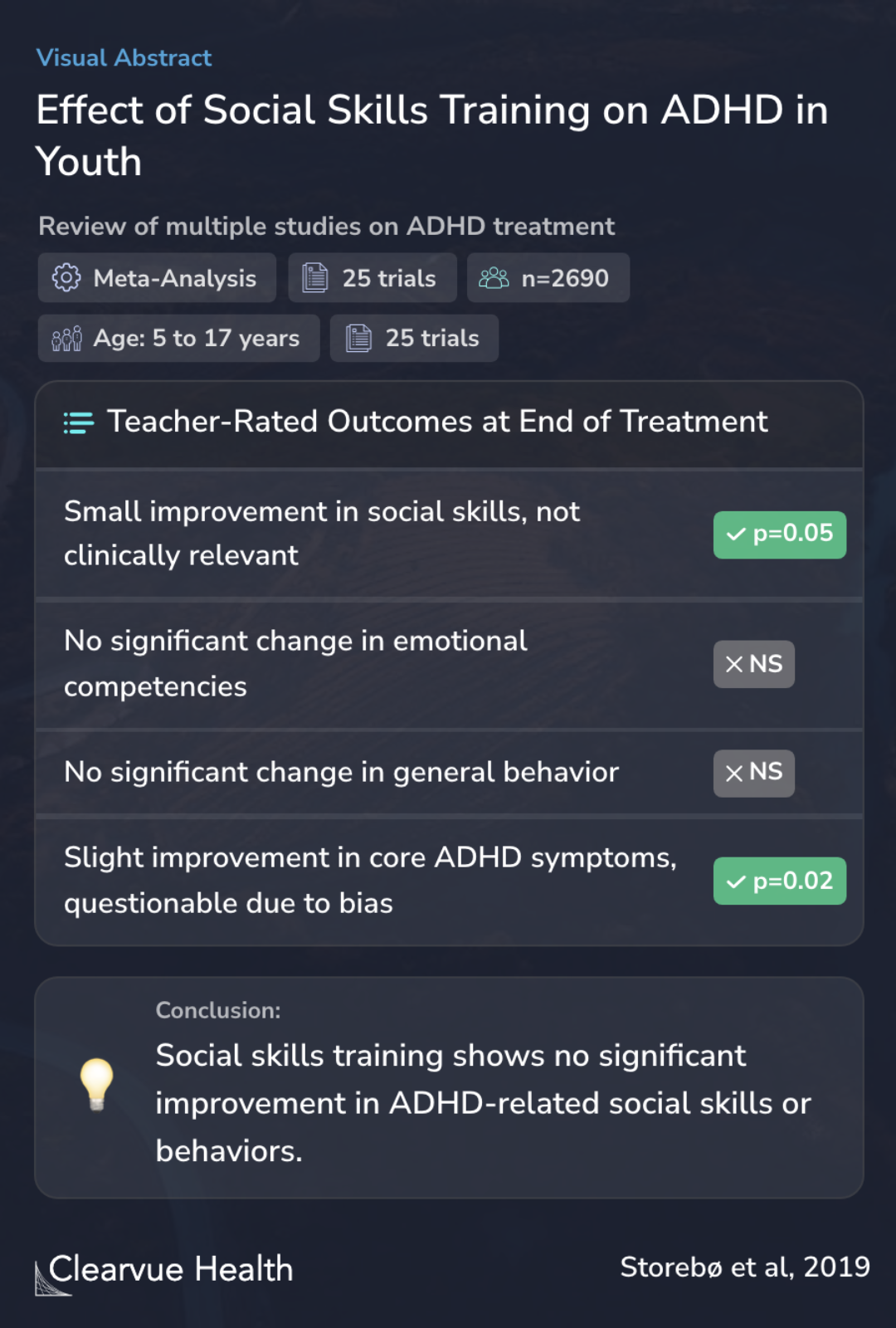Social skills training for attention deficit hyperactivity disorder (ADHD) in children aged 5 to 18 years
Effect of Social Skills Training on ADHD in Youth
Storebø OJ, Elmose Andersen M, Skoog M, Joost Hansen S, Simonsen E, Pedersen N, Tendal B, Callesen HE, Faltinsen E, Gluud C

Objectives
The paper set out to evaluate the good and bad outcomes of teaching social skills to kids and teenagers who have ADHD.
To assess the beneficial and harmful effects of social skills training in children and adolescents with ADHD.
Methods
To understand the impact of social skills training on children and adolescents with ADHD, the authors embarked on a comprehensive search in July 2018. They delved into multiple databases, sifted through conference abstracts online, and reached out to experts to uncover both published and yet-to-be-published randomized clinical trials. Their investigation was not confined by language, publication year, or the publication's status, ensuring a broad and inclusive review. The focus was on randomized clinical trials that compared social skills training with either no intervention or a waiting-list control, with the option of including pharmacological treatment in both groups. The methodology was rigorously aligned with the Cochrane Handbook for Systematic Reviews of Interventions, utilizing Review Manager 5 software and Trial Sequential Analysis for data analysis. Bias was meticulously assessed, and the certainty of evidence was gauged using the GRADE approach, ensuring a thorough and reliable review process.
In July 2018, we searched CENTRAL, MEDLINE, Embase, PsycINFO, 4 other databases and two trials registers.We also searched online conference abstracts, and contacted experts in the field for information about unpublished or ongoing randomised clinical trials. We did not limit our searches...
Results
The research included 25 randomized clinical trials, encompassing a total of 2690 participants aged between five and 17 years. Some of these participants also had other health conditions alongside ADHD. The interventions tested varied widely, from social skills training to cognitive behavioral therapy and beyond, compared against controls like no intervention or being placed on a waiting list. Despite the variety of interventions and the large number of participants, the findings revealed only minimal improvements in social skills and core ADHD symptoms, which were not deemed clinically significant. This was particularly evident in teacher-rated social skills and emotional competency assessmens, where no substantial changes were noted. The slight improvements observed in core ADHD symptoms were clouded by concerns over bias, questioning their reliability. The study's rigorous approach, including the assessment of bias and the use of meta-analyses, highlights the complexity of measuring the impact of social skills training in this context. Despite the extensive research, the results suggest that social skills training may not significantly alter the social skills or general behavior of children and adolescents with ADHD, calling for further research to explore these interventions' efficacy.
We included 25 randomised clinical trials described in 45 reports. The trials included a total of 2690 participants aged between five and 17 years. In 17 trials, participants were also diagnosed with various comorbidities.The social skills interventions were described as: 1) social skill...
Conclusions
The paper concludes with a cautious perspective on the effectiveness of social skills training for children and adolescents with ADHD, indicating that current evidence does not strongly support or oppose the use of such training. It points out the need for more well-designed trials, with low risk of bias and enough participants, to truly understand the value of social skills training in managing ADHD. This call for further research highlights the ongoing quest for effective interventions in ADHD, particularly in improving social skills and behaviors, which are crucial for the well-being and development of affected individuals. The findings from this comprehensive review serve as a critical reference point for future studies, emphasizing the importance of high-quality research in this field.
The review suggests that there is little evidence to support or refute social skills training for children and adolescents with ADHD. We may need more trials that are at low risk of bias and a sufficient number of participants to determine the efficacy of social skills training versus no...
Key Takeaways
Context
Understanding the impact of ADHD on social interactions is crucial, as it affects not only academic performance but also personal relationships and overall quality of life. This study sheds light on the challenges of addressing social skills deficits in children and adolescents with ADHD through training programs. Given ADHD's significant influence on social functioning, exploring effective interventions remains a key priority for researchers and practitioners alike.
The insights from this study contribute to the broader conversation on ADHD management, emphasizing the need for well-grounded, practical strategies to support individuals affected by this condition in their social development.